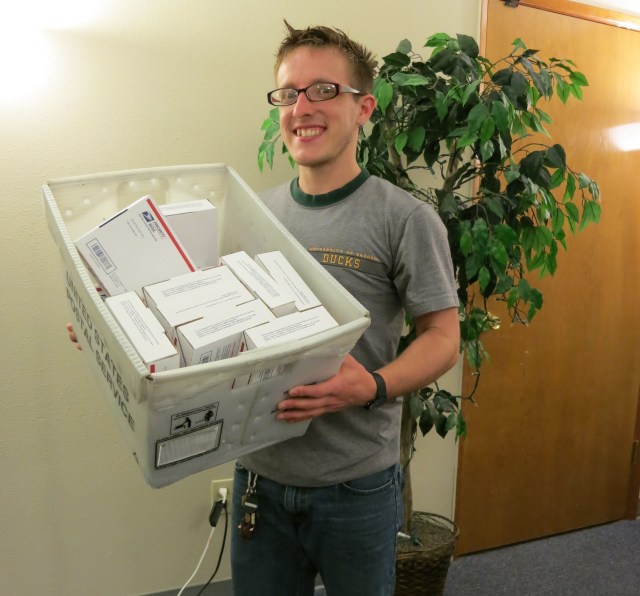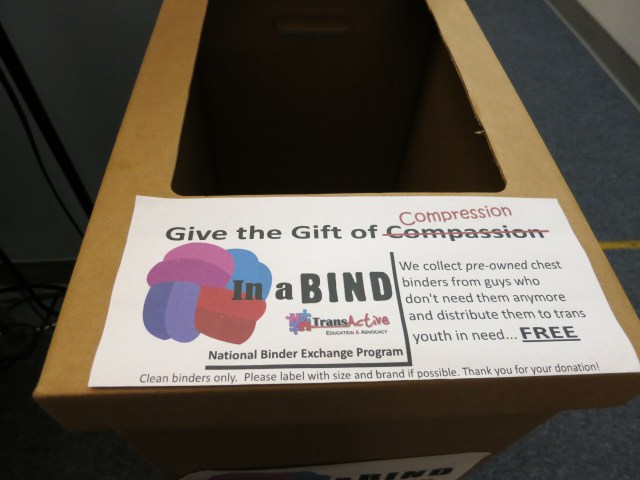
In a Bind Helps Get Trans* Youth Out of One
Chest binders (or “compression shirts”) are a simple concept: they flatten and shape the chest area and, where necessary, conceal breasts. They basically look like tank tops but have a whole lot more compressing power, and as a result are often used by transmasculine, masculine-of-center and genderqueer folks, among others.
Due to financial, familial, and a host of other complicated reasons, many transmasculine and genderqueer youth don’t have easy access to binders. Luckily, youth seeking chest binders have a new resource available to them: In a Bind, a Portland-based binder exchange program launched in March 2012, accepts donations of used and new chest binders for transmasculine and genderqueer youth and ships them all over the United States at no cost. In a Bind is run by TransActive, a nonprofit that serves the needs of transgender and gender nonconforming children and youth, as well as their families and allies.
I recently visited the TransActive office in Portland, Oregon and chatted with Kit Crosland, Program Coordinator of In a Bind. (I also got to meet other staff members, and was even offered cake!) I left very excited about the project, and feeling like I really wanted to convince you all to donate, volunteer and spread the word.

Kit
In a Bind is the brainchild of Kate Levy, a TransActive volunteer and mother of a trans child. While Kate is clearly a supportive parent, she knew that for many children in less-ideal family situations, chest binders were unobtainable. She approached Jenn Burleteon, executive director of TransActive with her idea, and since March of 2012 In a Bind has shipped 95 binders to youth in need.
“The program is all based on donations. It’s in the spirit of helping out your own,” says Kit. Binders are frequently donated by transguys who have had top surgery, changed size, or found a size or style that works better for them. In a Bind also accepts donations of new binders, as well as monetary donations used to offset shipping costs.
Transmasculine and genderqueer youth can apply for a binder through In a Bind’s website. (There is also a paper application, but according to Kit, it is rarely used—”kids are so tech-savvy these days,” he says.) Applicants must be 21 and under and have a mailing address in the United States (applicants 22 and over have the option of checking out the Big Brother Binder Program, which has been providing binders to transguys in need since 2001).
Along with the binder, applicants also receive information targeted toward their parents or guardians. As Kit explains, “We include a letter to the parent, basically saying anything and everything we can think of to get the binder to the child if a parent intercepts the package. It says,’This is safe for your kid,’ ‘Your kid isn’t the only one who wants this.’ Literally anything we can think of that could possibly help if a parent is ready to throw it in the trash.”

The package also contains a brochure targeted at anyone who interacts with transgender or gender nonconforming youth. Whether a parent intercepts the package or not, youth can choose to share it with their families. “If the only reason they’re not getting a binder is because their parents don’t understand, we need to give them tools toward fixing that,” Kit says. Many applications tell stories of unsupportive parents: one 16-year old writes, “I don’t have any other way to get myself a binder. I don’t have the money and my parents aren’t supportive. I’ve asked and they just think I’m some freak for wanting to look the way I feel.”
While Kit is very proud of the 95 youth helped by In a Bind, there are still over 600 people on the waiting list. There is obviously a huge need for chest binders out there, which highlights how important they are to many transmasculine and genderqueer youth. As Kit explains, there are two main reasons why binders are so important: they help people feel good about themselves and they “curb the body dysphoria of having these things on your chest that you don’t identify with.” One 17-year-old applicant writes, “Whenever I look in the mirror I become extremely upset, stressed, anxious, confused and even sick or angry because what I think and feel is so incongruent with how I look.”
In addition to helping with body dysphoria on an internal level, binders also affect how people are perceived and treated, and can actually protect the physical safety of the wearer.
“You’re presenting your gender to the world. If you’re presenting male or you’re presenting androgynous and you’ve got very obvious breasts, people aren’t going to treat you as the gender you are presenting,” Kit explains. “There’s a disconnect there, and that can cause people to use the wrong name or pronouns, obviously. And I’m not brushing that aside, that is really huge. It goes from that – the minor things that add up over time – to actual violence and assault.”
Many applications have included stories about experiencing violence. One 15-year old writes, “I have been jumped twice in the past month. Maybe if I did a better job of passing, I wouldn’t have so many issues with cisguys.”
Having access to proper chest binders also protects the physical safety of transmasculine and genderqueer youth because many people who can’t access a binder use Ace bandages or duct tape instead, which can cause health problems.
Interested in getting involved? Consider donating a binder, or supporting In a Bind in other ways. If you’re in the Portland area, consider volunteering! TransActive is in desperate need of volunteers to help with In a Bind, as well as other parts of the organization.
Many youth who have received binders have written touching thank you notes to In a Bind, and because I want to warm your heart, here are a few. All names have been changed.
I want to thank you so much for having this program running. You are wonderful people. I bet this has been, and will continue be a great program for helping us out. Because, honestly, there really isn’t much you can do for yourself in this state if you’re under 18 and your parents disapprove. So, honestly, from the bottom of my heart, thank you. And continue to be wonderful.
Anthony, 16, Wisconsin
Thank you so much for all of your understanding and help. It is an incredible thing you have done for those who are unable to purchase a binder on their own. I appreciate this so, so much.
Adrian, 18, Illinois
Thank you SO much. I had a really crappy week, and this just made it all better. You have no idea how much I appreciate what you’re doing, not only for me, but for all of the other teenage transguys out there. You’re really quite a life saver.
Nick, 17, New York
I just want to thank you for accepting my application. I was so excited to receive your email and can’t wait to get my binder. I want to show my support and appreciation for the program so I’m sending a small donation. I can’t give a lot, but I want to help in any way that I can and maybe help to make someone as happy as I am.
Kevin, 15, with $3 donation